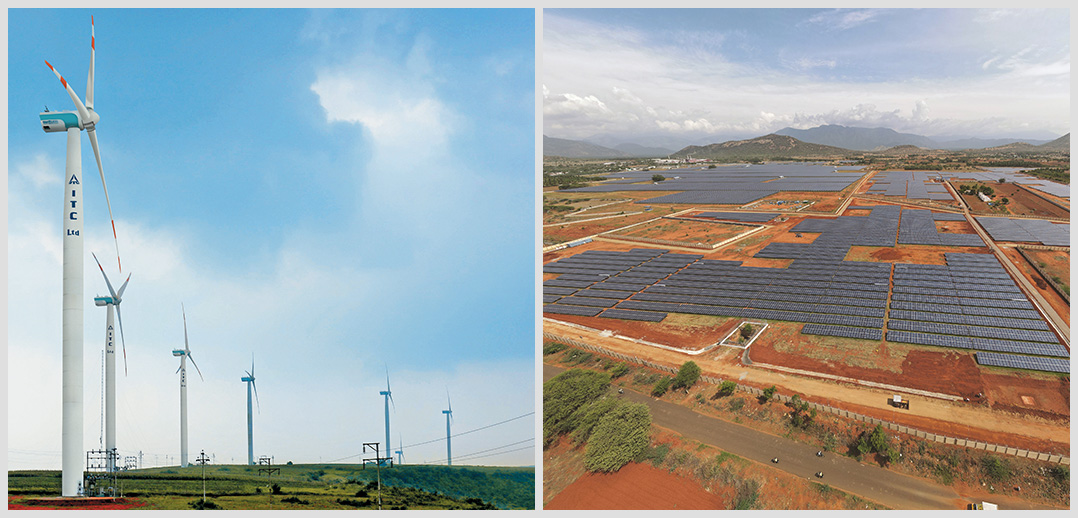
Climate change has spiralled into a global crisis. Studies have shown that fossil fuels are the largest contributors to climate change, accounting for more than two-thirds of global greenhouse gas emissions. This makes the transition to sustainable energy a critical factor in the fight against climate change.
India has demonstrated its leadership in climate action with its enhanced Nationally Determined Contributions that includes ambitious renewable energy targets and ITC's climate action plan resonates deeply the nation's objectives.
As a responsible corporate citizen contributing to India's transition to a low-carbon economy, energy is a key focus area in ITC's strategy for mitigation of climate change risks. Committed to reducing its dependence on energy from fossil fuels, ITC has been expanding its renewable energy portfolio as a top priority.
ITC currently utilizes wind, solar and biomass energy to meet both for both renewable electricity and renewable thermal requirements.
Biomass: ITC has been progressively transforming its operations by replacing existing fossil fuel-fired boilers with biomass boilers for thermal energy generation. The Company has recently commissioned a state-of-the-art and future-ready High Pressure Recovery Boiler at its Bhadrachalam paper mill, replacing conventional soda recovery boilers, which will contribute towards reducing carbon footprint through lower coal consumption.
Solar Energy: ITC has invested in several solar electricity projects. Rooftop solar power units have been installed in Ambernath, Hyderabad, Trichy, Kapurthala with Bangalore and Chennai units in the pipeline. ITC has set up an offsite solar power plant in Tamil Nadu with capacity of 17.9 MW. Three additional offsite solar plants are in the pipeline.
Wind Energy: ITC has invested in wind energy to increase its share of renewable energy. Interventions include continued wheeling of wind energy through interstate open access. ITC has set up a state-of-the-art 21 MW wind farm in Karnataka.
ITC's iconic luxury hotel assets are a trailblazer in green hoteliering through their ethos of 'Responsible Luxury'. The Company has installed windmills in Tamil Nadu and Karnataka to power ITC Grand Chola in Chennai and ITC Gardenia in Bengaluru. ITC also has projects in Andhra Pradesh and Rajasthan to supply to the respective locations.
Currently, around 50% of ITC's total energy requirements is met from renewable sources. With investments over the years, ITC has increased its renewable electricity capacity to 178 MW.
In addition, 47% of grid purchased electricity requirements (excluding onsite cogeneration and DG electricity) were met from renewable sources.
12 ITC units meet more than 90% of their electrical energy requirements from renewable sources.
Five of ITC's hotels have more than 90% renewable electricity share. Moreover, ITC Hotels and Welcomhotels have achieved global 2030 Carbon emissions targets well ahead of time.
As part of its Sustainability 2.0 vision, ITC is pursuing a multi-pronged climate strategy that entails extensive decarbonisation and building resilience against climate risk across the value chain. In line with the Company's Sustainability 2.0 goals, ITC continues its efforts towards meeting 100% of purchased grid electricity requirements from renewable sources, and achieving 50% renewable energy share in its total energy consumption by 2030 based on a mix of energy conservation and renewable energy investments, despite significant enhancement in its scale of operations going forward. ITC's bold and ambitious Sustainability 2.0 vision paves the path for a sustainable future that is in sync with India's efforts to transition to clean, renewable energy sources to prevent the most severe impacts of the global climate crisis.